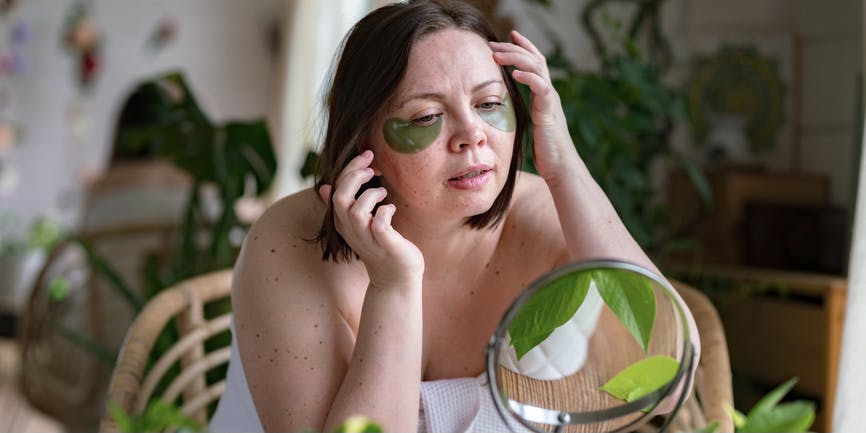
What do itchy skin and rashes have to do with severe heat?

This is our 100th newsletter! We’re honored to be a trusted source of vetted health + wellness advice. And we’ve grown so much over these last two years. Dr. B now treats 25+ conditions across primary care, dermatology, sexual health + reproductive health—all with affordable online consultations.
Last week, we covered how severe heat can be especially brutal for those with certain preexisting conditions. We shared how to help keep pets from becoming overheated, too!
This week, we dig into how severe heat can affect three dermatology conditions—eczema, rosacea and melasma. (The good news? Dr. B can help you get prescription treatments with an online health assessment!) Then we close out our Healthcare hub with the latest Covid-19 news to know.
But first, help us blow out 100 candles as we sink a fork into…
- The Checkup: hot weather care tips
- Face It: eczema + rosacea + melasma
- Healthcare: Covid-19 updates
The Checkup
- Don’t buy into the TikTok hype. Nightshades are good for you
- Dr. B treats it treats it. But psoriasis can worsen during summer
- Here’s why you really shouldn’t mix ibuprofen + alcohol
- Dermatologists review easy-to-carry sunscreen sticks
- How to advocate for yourself + discuss pain with your doctor
- Black people do get skin cancer + more skin myths corrected
- These easy, anti-inflammatory peach recipes sing of summer
Spotlight: eczema!

Eczema (or dermatitis) is a type of skin inflammation. It can cause dry, itchy skin + rashes or scaly patches on the face, inside the elbows and behind the knees. There’s no one cause of eczema. But genetics, an overactive immune system and environmental + emotional factors play a part.
Prescription eczema treatments include Tacrolimus ointment and Eucrisa, which can help calm the immune response + reduce inflammation. Extreme heat can make symptoms feel itchier + high humidity can trigger eczema flares. So it's vital to keep your body temperature cool + your skin clean and dry.
Learn more about our online eczema treatments
Spotlight: rosacea!

Rosacea is a genetic condition that largely affects people assigned female at birth (AFAB) over 30. On light skin tones, symptoms of rosacea can look like an overall blush or dry, tight skin with red patches. On dark skin tones, they can look like a dusky brown coloring or areas of darker skin. In severe cases, rosacea can cause red, sensitive pimples + visible blood vessels.
Prescription rosacea treatments include topical Metronidazole and Ivermectin creams, which can reduce bacteria and cell-damaging microorganisms on the skin. Over 60% of people with rosacea say sunlight is their biggest trigger—followed by hot weather flare-ups. So keep covered, hydrate up + try to keep your core body temperature cool.
Learn more about our online rosacea treatments
Spotlight: melasma!

Melasma happens when skin cells create too much melanin—the substance responsible for pigmentation. More common in people AFAB with dark skin, it can cause dark blotches or smooth, freckled patches on the face. Increased hormone levels because of birth control pills, pregnancy + hormone replacement therapy often trigger it.
Prescription melasma treatments like topical creams can reduce melanin production, minimize swelling + help skin turnover. Sun exposure and tanning can make visible melasma more pronounced. So keep your skin covered + use high-quality sunscreen.
Learn how Dr. B treats melasma
Healthcare 411
Is it time to be worried about Covid-19 again? (Vox). Covid-19 wastewater levels nearly doubled in the last month. Emergency care visits are up, too. Severity depends on several factors. (Like age, vaccination status + preexisting conditions.) So read the article for what to do if you have Covid-19 today + how to protect yourself and others.
Study: 1 in 6 kids have persistent COVID symptoms for 3 months after infection (CIDRAP). Study: 1 in 6 kids have persistent COVID symptoms for 3 months after infection (CIDRAP). 31 studies on 15,000 children show that sleep issues, sore throat + fever are the most common of 20+ chronic symptoms. This area requires more study + we don’t know what this means for long-term development. But this analysis is the largest to date on Covid-19 + kids.
Fatigue Can Shatter a Person (The Atlantic). Post-exertional malaise (PEM) is a crushing form of fatigue. For those with long Covid or ME/CFS, it often follows even mild activity. “If in fatigue your batteries feel drained, in PEM they’re missing entirely.” Read the article for how researchers can identify PEM + how it affects millions.
Sign up for the free Dr. B newsletter for a weekly report on the latest in healthcare + research-based advice for staying healthy and mentally well.

